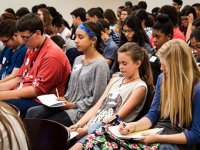Transforming Schools Through Cultural Self-Reflection
While there is a lot of discussion these days about school culture, and how to best manage and shape it, I believe it might be more beneficial to talk about cultural self-reflection instead. If we believe in the transformative power, insight, and wisdom of the arts and humanities for self-reflection in the lives of our students, why can't we then use these cultural resources to help guide our entire institutions?
Cultural self-reflection is a way of understanding yourself or institution by exploring how the culture you live in shapes who you are. The cultural forces around us -- such as consumerism, industrialization, and secular humanism -- will triumph over any mission statement or strategies for envisioning and managing school culture, whether we like it or not.
In fact, I think it is easier to turn our back on the world and talk about school culture than it is to educate our students and help them face the world as it is. It is our job to understand and respond to these cultural forces if we want to have healthy school environments.
We can help our students and institutions through cultural self-reflection. We need to guide them in studying and exploring the works and ideas found in philosophy, literature, history, and artistic expression. Teachers, administrators, and students can explore the world of the arts and humanities together. They can discuss shared beliefs and question together the ways by which we live.
In other words, the entire school community -- not just students -- can find critical insight and inspiration from the arts and humanities. The arts and humanities can provide a framework for making positive changes in our institutions.
Culture is at the crux of issues we want to deal with in our classrooms and institutions. If we ask our students which of the world's problems we should address, many of the big ones -- climate change, educational inequality, poverty, and world hunger -- are all, in essence, cultural problems.
In other words, we might have the technical and material means to solve these problems, but because of the way we choose to live and the beliefs we choose to hold, we don't. In the meantime, "culture" has become a popular word to toss around in the management world. We talk about "corporate culture," "office culture," and "school culture," but culture cannot be managed from the front office. Culture encompasses ways of living, ideals, and beliefs that transcend any one institution.
Inspiration
A common and worthy strategy is to use the arts, specifically poetry, as a point for inspiration. Our school head, Dick Bradford, reads the poem "Wild Geese" by Mary Oliver at the beginning of every school year. This poem sets the tone for the entire year, and it shows that no matter how business as usual work and studying might feel over the following months, the complexity and mystery of the poem points to a source of deeper meaning and insight that is just below the surface of our daily routines.
Professional Development
I would also recommend that schools consider professional development and summer reading that draws upon the arts and humanities. Imagine how much great literature, brilliantly written biographies, and narrative films might frame schoolwide initiatives and discussion.
Empathy and Insight
Through cultural self-reflection, schools can create an empathetic framework for understanding the world in which we are educating our students. Literature and poetry has much to teach us about how humans have suffered and sometimes triumphed over the most pressing of problems.
Culture shapes our schools and institutions from the outside in. As educators and administrators, it is therefore our job to understand how to align, find inspiration from, and bring critical insight to the cultural forces around us.
What works of literature, philosophy, or visual and performing arts might most benefit your school community? Please share in the comments section below
